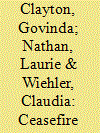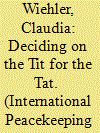| Srl | Item |
| 1 |
ID:
178370


|
|
|
|
|
| Summary/Abstract |
The causes and consequences of ceasefires have become a burgeoning area of research. The concept of ceasefire success is integral to this research and plays a key role as either the dependent or independent variable in both qualitative and quantitative work. Despite its importance, it is not clear how ceasefire success should be conceptualized. This critically hampers the progress of theoretical and empirical research on ceasefires. This article offers a conceptual framework based on the central proposition that ceasefire success should be assessed in terms of two inter-related but conceptually distinct criteria: the immediate objective and the underlying purpose. The immediate objective, which is embedded in the definition of a ceasefire, is the cessation of hostilities (either permanently or temporarily). While all ceasefires share this objective, their underlying purpose, which is the reason for establishing the ceasefire, varies widely across cases. The immediate objective and the purpose, while conceptually distinct, are linked since the purpose informs the temporal and geographic scope of the cessation of hostilities. Based on this framework, we argue that researchers interested in ceasefire success need to clearly identify their assumptions and conceptual choices, which should take account of the political context of the ceasefires in question.
|
|
|
|
|
|
|
|
|
|
|
|
|
|
|
|
| 2 |
ID:
178373


|
|
|
|
|
| Summary/Abstract |
Ceasefires are agreed in most intra-state conflicts and the majority of these agreements are violated. Yet, the subsequent dynamics of retaliation are still poorly understood. This article proposes a novel conceptual framework, describing the decision-making of conflict parties after ceasefire violations. I argue that the conflict parties face the two-fold decision-making problem of choosing a proportionate reaction: a reaction that assures their interest in the ongoing conflict and in the continuation of the agreement. When proportionate reactions are chosen, mutual compliance with the ceasefire can be re-established. The empirical implications of this framework are illustrated with evidence from two ceasefires in the Mindanao conflict in the Philippines. This article advances our analytical understanding of an overlooked period during armed conflict, i.e. while a ceasefire is in place. This is critical since collapsing ceasefires can lead to a deterioration of the humanitarian situation and of the prospects for peace. More generally, this article draws the attention to the counter-intuitive function of violence to secure cooperation in intra-state conflicts.
|
|
|
|
|
|
|
|
|
|
|
|
|
|
|
|